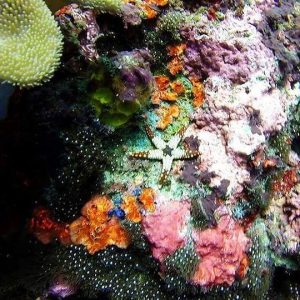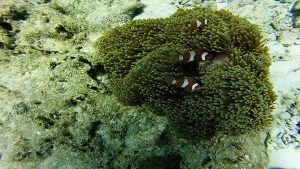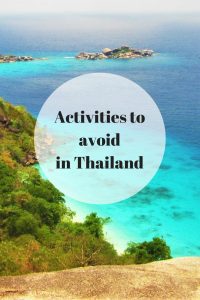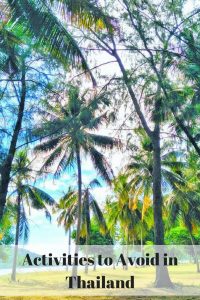Activities To Avoid in Thailand
Read on to find out what activities to avoid in Thailand and what ethical experiences you should do instead. Having lived in Thailand for 8 years and travelled here extensively, this Thailand travel blog is to help you find out the dos and donts in Thailand and a better way to travel without harming wildlife, the environment and to be careful where you spend your money so it doesn’t harm local people too.
Is it possible to have ethical animal experiences in Thailand?
Thailand is a place of beauty, adventure and there are so many amazing activities to try here, that after three years of living here, I am still finding new activities and places to visit. Unfortunately there are also a number of activities that have given rise to exploitation, both in regard to wildlife and people. Tourists do have the power to bring about positive change and, particularly in a country like Thailand, where many locals are keen to reap the benefits of tourism, it is important for tourists to do their research into putting their money into ethical activities involving both people and wildlife.
The truth about elephant riding in Thailand
Many tourists want to ride elephants when visiting Thailand but first hopefully they can ask the following questions and do some research into elephant abuse in Chiang Mai and Phuket. Is it ethical to ride an elephant in Thailand? Where can we ride rescue elephants in Thailand? Is riding an elephant bad for its back?
Riding an elephant is animal abuse. Tourists ask me where to ride an elephant in Thailand, where is the best place for elephant riding and about elephant riding costs and please just stop there. The truth about elephant riding is that it is animal abuse. All elephant riding with seats is a widespread form of animal abuse in Thailand, it deforms the back of the elephant and elephant riding is cruel. Alternatives to elephant riding include visiting an ethical elephant sanctuary or seeing wild elephants in Thailand.
Ethical elephant sanctuaries in Thailand
When I first visited Thailand in 2013 I could only find 2 elephant sanctuaries that refused to offer elephant riding. Nowadays many sanctuaries are refusing to offer elephant riding and it is the tourist demand that has made this change. Your actions can make a difference so let’s make decisions that will help protect elephants rather than harm them. My favourite alternative to elephant riding, and I recommend as even better than a sanctuary is to see wild elephants in Thailand which is, after all, where they belong. Seeing wild elephants in the jungle is one of my bucket list experiences and you can see them in a national park just a few hours from Bangkok – Khao Yai National Park. Read here for more details about how to visit Khao Yai National park – one of my favourite national parks in Thailand that has a good chance of seeing wild elephants in the jungle.
If you want a more luxury experience to see rescue elephants near Bangkok then my favourite is the I Love Phants Lodge, a rescue centre not only for elephants but many other Thailand animals who were taken from the entertainment industry or the pet trade. Read my I Love Phants Review here and find out why I always recommend this ethical elephant sanctuary near Bangkok which helps elephants in Thailand.

The truth about tigers in Thailand: Ethical Tigers Thailand?
Is it ethical to visit Tiger Kingdom in Thailand? Where can I take photos with tigers in Phuket or Chiang Mai? Are tigers drugged in Tiger Kingdom?
Probably one of the top experiences of what NO to do in Thailand. The cruel truth is that there is no such thing as an ethical tiger experience. Tigers are wild, dangerous animals and belong in the jungles of Thailand, not in some sort of petting zoo, in a concrete enclosure for selfies with humans. To visit a tiger temple in Thailand or take pictures with tigers means you are participating in animal abuse. The infamous tourist temple “Tiger Temple” fortunately has now been closed down but there are many other “sanctuaries” appearing. When Tiger Temple was investigated, they found dead tiger cubs in a freezer and allegations of missing adult tigers thought to have been sold on the black market to China for tiger bones. This scandal is on top of the commonly held assumption that these tigers are drugged in order for tourists to take photos with them. I personally feel that the claim that people can get close to them because they are domesticated tigers brought up around people does not have any ground. Getting into a cage with a grown adult tiger is dangerous, no matter how the animal was raised and therefore the drugging theory is highly likely. Read more about the truth about Thailand’s tiger temple on the BBC website.
Dos and Donts in Thailand : Do visit a tiger rescue centre
If you want an ethical tiger Thailand experience then head to Wildlife Friends Foundation Thailand (WFFT) a rescue organisation and the best rescue animal sanctuary in Thailand. For how to see rescue tigers and elephants near Bangkok then read this article.
Dos Donts Thailand : Don’t support sex tourism
The dark side of Thailand’s sex tourism industry
I strongly recommend avoiding going to a pingpong show, sex show or participate in any activities relating to the sex industry. Thailand is a hub for human trafficking and there is no knowing how the women, men and even children in these industries are treated. 610,000 people are thought to be enslaved in modern day slavery in Thailand. (Source Maps | Global Slavery Index) and some of these unpoliced, illegal industries have been found to ‘employ’ underage prostitutes, indicating child abuse and exploitation. Is this really where you want your money going?
Dos and Donts in Thailand: Culture
Respecting Thai culture should be an important consideration when visiting on vacation or backpacking. Sunbathing in the nude, women going topless on a beach and males riding around on scooters without shirts is not considered appropriate or respectful behaviour by the majority of Thai people. Spain this is not. Most of Thailand is fairly conservative, whether the locals are Buddhist or Muslim and getting your baps out on the beach is not acceptable here. It is important to be respectful when visiting other countries where the culture is very different to our own.

Enjoy beautiful beaches in Koh Lipe
Dos and Donts in Thailand – The Ocean
Another important rule in Thailand is about being respectful to the ocean. Standing on coral reefs damages them and coral reefs are already under severe pressure from climate change and rising ocean temperatures. Coral is extremely fragile and if you touch it, not only could you end up injured, but you are killing this vital eco-system that the ocean relies upon. Please be extremely careful of where you are stepping in the sea and inform any other visitors of the same. Many tourists stand on coral because they are ignorant of the fact they are damaging it. Please spread the word and don’t be shy about letting other tourists know not to stand on coral. Tour operators should be informing tourists so make sure to include them if their boat of tourists are not behaving respectfully towards the ocean.

Dos and Donts in Thailand: Touching wild animals
There are regular news stories in local papers here in Thailand about people touching turtles or Instagram photos of people holding up a starfish. That is a wild animal and you are disturbing it. Remember to always be respectful of wildlife.

Whale Watching in Thailand from a respectful distance – an amazing and ethical experience to have, just an hour from Bangkok! Read my article here about how to see whales in Thailand.
Dos and Donts Thailand – Photo Opportunities with wild animals
Do not take photos in the markets or streets with ‘pet’ monkeys or gibbons. These are animals that belong in the wild and should not be used in the tourist industry in this way. Often teeth are painfully removed to ensure the animal does not bite people and they are often wearing nappies and chained up. Visit beautiful national parks in Thailand to see monkeys, gibbons and wildlife, where it should be – free, wild and in the jungle.

Dos and Donts Thailand – Fishing
Overfishing is one of the biggest threats to our ocean globally and in particular in Thailand where Marine National Parks are not even fully protected with no take zones. Be a part of the solution, protect fish, only fish sustainably and if you cannot be sure it is sustainable (which we rarely can) then don’t add to this problem. See the recent Bangkok Post article about a Dutch tourist arrested for fishing parrotfish.

And for things NOT to miss in Thailand check out this Thailand blog post
For more information regarding Thai culture and how to be respectful read this article
Pin Me for Later

